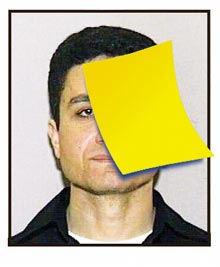9/11 COMMISSION PULLS WOOL OVER OWN EYES

9/11 COMMISSION: FROM L TO R: THOMAS KEAN, LEE HAMILTON, STAFF MEMBER DEITRICH SNELL
You’ve got to hand it to the 9/11 Commissioners. When push comes to shove, they know when to duck:
The Sept. 11 commission concluded that an intelligence program known as Able Danger “did not turn out to be historically significant,” despite hearing a claim that the program had identified the future plot leader Mohammed Atta as a potential terrorist threat more than a year before the 2001 attacks, the commission’s former leaders said in a statement on Friday evening.
The statement said a review of testimony and documents had found that the single claim in July 2004 by a Navy officer was the only time the name of Mr. Atta or any other future hijacker was mentioned to the commission as having been known before the hijackings. That account is consistent with statements this week by a commission spokesman, but it contradicts claims by a former defense intelligence official who said he had told the commission staff about Able Danger’s work on Mr. Atta during a briefing in Afghanistan in October 2003.
“Not historically significant?” How’d we get there from “if the briefers had mentioned anything that startling, it would have gotten their attention?”
You don’t have to read between the lines to see what’s going on here. In fact, 9/11 Commission spokesman Felzenberg couldn’t have made it any more plain when he said “The information that he provided us did not mesh with other conclusions that we were drawing” from the commission’s investigation.” And just to make sure that we understood perfectly that the Commission ignored the Able Danger revelations because it didn’t fit their pre-conceived ideas they were pushing in the 9/11 narrative, Mr. Felzenberg repeated himself by saying “This information was not meshing with the other information that we had.”
As the Captain points out, the Commission’s entire defense boils down to two facts: 1) The Commission had no previous evidence that 9/11 hijacker Mohammed Atta was in the country at the time Able Danger says he was; and 2) The reason they know when Mr. Atta was in the country and when he wasn’t was because he always used his real name while traveling abroad.
Huh?
The Captain explains:
…it’s also worth noting that the Commission had an unusual standard for determining Atta’s timeline — they relied on him to travel under his own name at all times. I discussed this in earlier posts, but it bears repeating: terrorists can change tactics situationally. All the report can possibly state was the first time Atta traveled under his own name or any known aliases, and then only if immigration records picked it up. It doesn’t take much imagination, however, to think that he may have traveled here under a separate cover once or twice first to test the system and to do preliminary research for his mission.
The question should be asked of the 9/11 Commission staff - especially Deitrich Snell who interviewed the Able Danger team member in July, 2004 - why they didn’t try to either prove or disprove his story by asking the Pentagon about the data mining operation. There’s also the question of the arrests in Germany of Iraqi Intelligence operatives in March of 2000; operatives that the Germans said “uncovered what they considered to be serious indications of cooperation between Iraq and bin Ladin,” and that “acting on CIA recommendations, [the Germans] had been focused on monitoring the activities of Islamic groups linked to bin Ladin.”
That makes two pieces of potential evidence ignored by Commission staffers (or not informed by the CIA about the German-Iraqi spy arrests?). How many other facts were discarded because, in Mr. Fetzenberg’s words, they didn’t “mesh” with conclusions already reached by the staff?
The Commission has made an effective counter to Congressman Weldon’s charges, placing the burden now on him to prove the Commission liars. The only way to do that would be to hold hearings and put some people under oath.
Expect those hearings to begin shortly after the August recess is over.
UPDATE
The Able Danger program was classified, of course, so we may never know exactly what it was and what it found out — especially since if the Pentagon was aware of Atta in 2000 it’s not likely to want to admit it in any case. However, I’m going to stick with my original guess: it produced some general information about al-Qaeda, but nothing specifically about Atta or the other 9/11 hijackers. That’s why no one ever mentioned Atta in the original reports. Later on, frustrated because their story wasn’t getting enough attention, Weldon and his source embellished it to suggest that Able Danger had specifically uncovered actionable intelligence about an al-Qaeda cell in Brooklyn headed by Atta.
Suitably cautious but fails to account for the fact that there are two different sources telling the Commission about Able Danger - once in October, 2003 (at the same time that Sandy Berger was getting sticky fingers in the National Archives) and July, 2004 which was at a time as Drum suggests that the Commission’s Final Report had mostly been written.
However, Drum may be correct in that it appears according to what the Commission staff is saying, Atta was not mentioned in the October, 2003 meeting. My reading of Weldon’s interview with Government Security News is that someone is lying; either the Able Danger team member or Commission staffers:
According to Weldon, staff members of the 9/11 Commission were briefed on the capabilities of the Able Danger intelligence unit within the Special Operations Command, which had been set up by General Pete Schoomaker, who headed Special Ops at the time, on the orders of General Hugh Shelton, then the chairman of the joint chiefs of staff. Staffers at the 9/11 Commission staffers were also told about the specific recommendation to break up the Mohammed Atta cell. However, those commission staff members apparently did not choose to brief the commission’s members on these sensitive matters.
UPDATE II
AJ from The Strata-Sphere who’s been on top of this issue since it broke:
There is no ‘credibility’ issues here! None. Able Danger is as credible as the other leads the government dropped and only realized post 9-11 they were missed.
The commission’s response only leads to more questions. I don’t know whether the answers will come out without this military official having to be named in public.
I’m afraid she’s right.
The INS Headquarters National Security Unit (NSU), which was created in the late 1990s in spite of considerable obstacles generated by the INS High Command, was one of the few and small success stories within the INS. The INS/NSU, circa 1999-2000, tried to post a liaison officer to the Defense Intelligence Agency (DIA) specifically to tap into DoD intelligence on counter-terrorism matters. The NSU Director at the time approved it and DIA bought off on the plan…but INS senior management above the NSU Director nixed it so it never happened.
Hindsight is alwayas 20/20 and the refusal of the INS to approve the liason with DoD, given the pre-9/11 mindset, was both to be expected and understandable. It should go without saying, however, that it would be nice to know that the situation has been rectified and such nonsense is no longer being practiced by the INS.
UPDATE III
Rusty Shackleford and Ed Morrissey are having fascinating back and forth regarding the Iraqi spies caught in Germany and whether or not they could have been connected to Mohammed Atta’s Hamburg cell.
Read the whole thing here. And here’s the Captain’s original post and follow up.
And here’s Rusty’s original post where they have a back and forth in the comment section.
